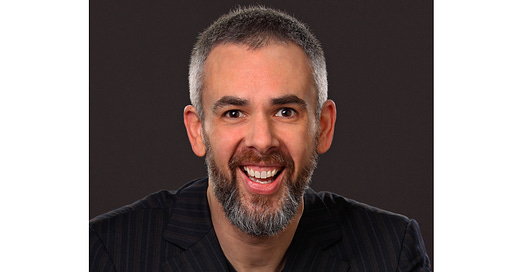This article is part of Fintech Leaders, a newsletter with almost 65,000 builders, entrepreneurs, investors, regulators, and students of financial services. I invite you to share and sign up! Also, if you enjoy this conversation, please consider leaving a review on Apple Podcasts, Spotify, or wherever you get your shows so more people can learn from it.
Live NYC Recording Alert!
Join us for a live Fintech Leaders recording with Mike Seckler, CEO & Co-Founder of Justworks, a multibillion-dollar fintech giant built in New York City.
See you at Barclays Rise NY on Tuesday, April 9 2024 as part of NY Fintech Week.
I sat down with Nick Peddy, CTO of Clear (YOU:NYSE), a publicly traded company with over 20 million members that’s built one of the largest identity platforms in the world. If you’ve ever traveled through an airport in the US, you’ve definitely seen them. Most recently, Clear expanded into financial services by launching its first reusable KYC solution.
In this episode, we discuss:
The future of digital identity and why re-usability is crucial
At the heart of Clear's vision is the concept of a "reusable identity." This approach suggests that once an individual's identity is verified to a certain standard, this authentication should be portable and applicable across multiple contexts and with multiple clients without the need for repeated verification. This idea is not just about convenience; it also represents a shift in the traditional paradigm of online identity verification, moving away from siloed, repetitive processes towards a more unified and efficient model. For consumers, this means a future where a single instance of identity check could suffice for everything from airport security to opening a new bank account, attending concerts, or even accessing financial services. The implications for the consumer experience are profound, offering a less intrusive way to navigate identity verification with minimal friction.
This streamlined approach does not compromise security or privacy. On the contrary, by centralizing the identity verification process through a centralized and trusted entity like Clear, Peddy argues individuals gain more control over their personal information. They can dictate who has access to their data and under what circumstances. This model also benefits institutions, which can onboard customers more efficiently while maintaining high standards of security and compliance.
Lessons and secrets to great management
“When you think about it, your job as a leader is to make sure that everybody that you're leading understands what you're doing and why you're doing it. And then they have the right tools, environment, colleagues, whatever it is to be successful at that thing.”
The essence of leadership, according to Nick, boils down to setting a clear vision and strategy, and ensuring the right team is in place to execute it. This simplification means that a leader's primary role is not to micromanage but to guide and enable. By focusing on these two aspects, leaders can create an environment where their teams are not just clear (no pun intended) about the direction but are also equipped and motivated to journey towards it. This principle is universal across leadership roles, whether in technology or any other field. It speaks to a fundamental truth about leadership: success is less about the leader's individual contributions and more about their ability to inspire, direct, and support their teams towards shared goals.
What it takes to run a great technology organization
“Most engineers are reticent to lead people because code is deterministic, and people are not, right?”
When it comes to the technology organization of a business, Peddy reminds us of the importance of maintaining a delicate equilibrium between fostering the natural curiosity and innovative spirit of engineers and aligning these efforts with tangible business outcomes. While technology can be fascinating in its own right, the magic only happens when code is applied to solve real-world problems. A successful technology organization encourages experimentation and tinkering but does so with a clear purpose and direction. This not only ensures that technological advancements are meaningful and impactful but also aligns the efforts of the engineering team with the broader objectives of the organization. The secret is harnessing the creative and curious instincts of engineers to drive forward solutions that matter, thereby creating a culture where innovation is purposefully directed towards achieving strategic objectives.
Why AI will not take our jobs anytime soon… and a lot more!
"The idea of Artificial General Intelligence (AGI) that can think like a human and actually behave like human and have freedom. That's not even something, that's still pure science fiction. It's not even something we have line of sight to. That's not a real thing, right?"
AI is a Complementary Tool, Not a Replacement. We have to understand that the latest tools of AI are designed to alleviate the tedium and manual labor associated with many tasks, rather than usurp humans of their jobs. This perspective is crucial in understanding the trajectory of AI development and its integration into the workplace. By automating routine and repetitive tasks, AI enables individuals to focus on aspects of their work that require a distinctly human touch—creativity, ideation, and collaboration. This approach can enhance productivity and job satisfaction, while accentuating the value of human ingenuity and emotional intelligence. According to Nick Peddy, AI is a "glorified spell checker" that enhances, rather than diminishes, human capability.
Want more podcast episodes? Join me and follow Fintech Leaders today on Apple, Spotify, or your favorite podcast app for weekly conversations with today’s global leaders that will dominate the 21st century in fintech, business, and beyond.



























Share this post